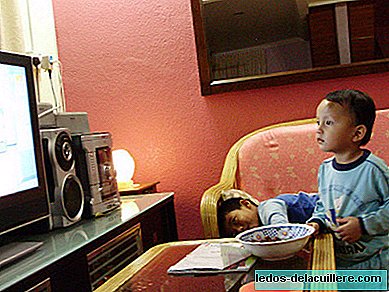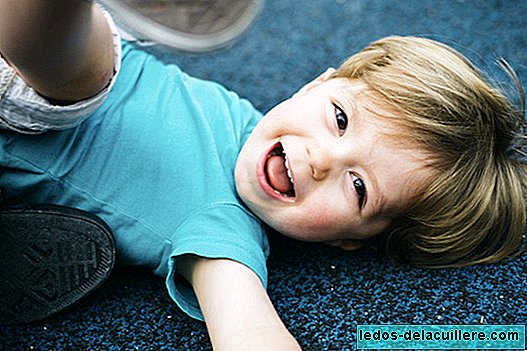Praise for children is necessary. They are a way to show them that we value them, help to improve their self-esteem and reinforce their personality, but eye with praise for children, because although the intentions are good, not everyone is worth it. The way we praise children is very important, because believing that we are sowing in them the seed of motivation, we can cause the opposite effect and harm them.
Carol Dweck, a Stanford professor of psychology, a pioneer in preaching that children should be praised, believes that the parents are not getting the point. She is based on the idea that children should be commended for their effort better than for their intelligence. Children who are praised for their intelligence give up taking new risks, while children who are praised for their efforts are motivated to improve. We will talk about how to praise children so they are better.
What is the growth mindset?
"We can all change with effort" is the motto of Carol Dweck, author of the book Mindset. Improvement is always possible. And this is applicable at all levels for any child (and anyone).
It is not the same to tell a child "You are the best, keep it up" that "I congratulate you for the effort you have made." The child who does not make mistakes is praised for his innate intelligence. We praise him for how clever he is, so that the child will be left with that perception we have of him and will have no interest in going beyond. Develop a conformist mental attitude, Dweck calls it, a fixed mindset.
Instead, a child who makes mistakes, who fails, develops the ability to learn from his mistakes. Fear of failure inhibits learning, but a child who takes advantage of these mistakes and strives to improve and learn evolves. Dweck calls him a growth mindset.
Praise the effort, not the intelligence

Dweck conducted an experiment with more than 400 children from twelve New York schools: he underwent a very easy test consisting of a puzzle. Once finished, the note was told to each child, followed by a phrase of praise. Half of the children were praised for their intelligence; The other half, for your effort.
They were then allowed to choose between two different tests. The first option was described as a series of more difficult puzzles, but the children were told that if they tried, they would learn a lot. The other option was an easy test, similar to what they had already done.
A simple phrase of praise seemed to have a lot of influence on the results: from the group of children congratulated for their effort, 99% chose the set of difficult puzzles: one more challenge, trying it is good. For their part, most of the boys praised for their intelligence decided on the easiest test.
But it's not just about effort
But beware, a growth mindset is not just about striving. Effort is the key, but it is not the only thing. It is very good to empathize and congratulate the effort, but after the effort, there has to be a reaction. It is important to give them tools to look for new approaches, to try new strategies and thus achieve the goal, which is to learn.
Otherwise, we are praising persistence, but we are not fostering the growth mindset. It is not to comfort them, but to motivate them to improve.
The key to instilling a growth mindset is to teach children that the brain is like a muscle that is strengthened with effort and perseverance.
Instead of telling them, for example, "Not everyone is good at math," a teacher or a parent should say, "Maybe math is not your strong point yet." The power of "still" leaves the door open to learning.
Let's give an example: If your 2-year-old son is building building blocks to make a tower and he doesn't get it, we must motivate him to keep trying and praise his effort. But do not stay alone in that step, because with the compliments you will not be able to build the tower.
The important thing is to teach you possible paths towards achieving your goal. "You haven't done it yet, but try to turn the block or try a bigger one." When he grows up, it will be he who will continue trying solutions to achieve his goals.
In a longitudinal study conducted by Dweck in collaboration with the University of Chicago, they found that children whose parents focused their praise on the effort when they were one, two and three years old, five years later were more likely to take on difficult challenges and try to improve that Children who had received praise focused on their personality as "You are the best", "You are the most intelligent".
Praise the process, not the result

So we don't praise our children because it can be counterproductive? We all like to be praised, and in fact the praises can be very positive, but you have to do it wisely.
We don't have to praise intelligence or talent in our children, but, as Dweck says, "praise the process in which the child gets involved: his effort, his strategies, his approach, his perseverance, his progress. Praising the process create strong and resilient children. "
That is, do not stay in the "Very good, you have tried hard" or "You have done your best", but motivate them to progress with a "I congratulate you for your effort, what can you try now?"
The power to believe that it can be improved
To delve deeper into Carol Dweck's growth mindset theory you can listen to this interesting Ted Talk entitled 'The power to believe that it can be improved '.

Mindset: The New Psychology of Success (Ballantine Books)
Today in Amazon for € 15.49











